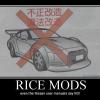Project: Anything Is Possible
Announcements
-
Similar Content
-
Latest Posts
-
I know why it happened and I’m embarrassed to say but I was testing the polarity of one of the led bulb to see which side was positive with a 12v battery and that’s when it decided to fry hoping I didn’t damage anything else
-
I came here to note that is a zener diode too base on the info there. Based on that, I'd also be suspicious that replacing it, and it's likely to do the same. A lot of use cases will see it used as either voltage protection, or to create a cheap but relatively stable fixed voltage supply. That would mean it has seen more voltage than it should, and has gone into voltage melt down. If there is something else in the circuit dumping out higher than it should voltages, that needs to be found too. It's quite likely they're trying to use the Zener to limit the voltage that is hitting through to the transistor beside it, so what ever goes to the zener is likely a signal, and they're using the transistor in that circuit to amplify it. Especially as it seems they've also got a capacitor across the zener. Looks like there is meant to be something "noisy" to that zener, and what ever it was, had a melt down. Looking at that picture, it also looks like there's some solder joints that really need redoing, and it might be worth having the whole board properly inspected. Unfortunately, without being able to stick a multimeter on it, and start tracing it all out, I'm pretty much at a loss now to help. I don't even believe I have a climate control board from an R33 around here to pull apart and see if any of the circuit appears similar to give some ideas.
-
Nah - but you won't find anything on dismantling the seats in any such thing anyway.
-
Could be. Could also be that they sit around broken more. To be fair, you almost never see one driving around. I see more R chassis GTRs than the Renault ones.
-
Yeah. Nah. This is why I said My bold for my double emphasis. We're not talking about cars tuned to the edge of det here. We're talking about normal cars. Flame propagation speed and the amount of energy required to ignite the fuel are not significant factors when running at 1500-4000 rpm, and medium to light loads, like nearly every car on the road (except twin cab utes which are driven at 6k and 100% load all the time). There is no shortage of ignition energy available in any petrol engine. If there was, we'd all be in deep shit. The calorific value, on a volume basis, is significantly different, between 98 and 91, and that turns up immediately in consumption numbers. You can see the signal easily if you control for the other variables well enough, and/or collect enough stats. As to not seeing any benefit - we had a couple of EF and EL Falcons in the company fleet back in the late 90s and early 2000s. The EEC IV ECU in those things was particularly good at adding in timing as soon as knock headroom improved, which typically came from putting in some 95 or 98. The responsiveness and power improved noticeably, and the fuel consumption dropped considerably, just from going to 95. Less delta from there to 98 - almost not noticeable, compared to the big differences seen between 91 and 95. Way back in the day, when supermarkets first started selling fuel from their own stations, I did thousands of km in FNQ in a small Toyota. I can't remember if it was a Starlet or an early Yaris. Anyway - the supermarket servos were bringing in cheap fuel from Indonesia, and the other servos were still using locally refined gear. The fuel consumption was typically at least 5%, often as much as 8% worse on the Indo shit, presumably because they had a lot more oxygenated component in the brew, and were probably barely meeting the octane spec. Around the same time or maybe a bit later (like 25 years ago), I could tell the difference between Shell 98 and BP 98, and typically preferred to only use Shell then because the Skyline ran so much better on it. Years later I found the realtionship between them had swapped, as a consequence of yet more refinery closures. So I've only used BP 98 since. Although, I must say that I could not fault the odd tank of United 98 that I've run. It's probably the same stuff. It is also very important to remember that these findings are often dependent on region. With most of the refineries in Oz now dead, there's less variability in local stuff, and he majority of our fuels are not even refined here any more anyway. It probably depends more on which SE Asian refinery is currently cheapest to operate.
-




Recommended Posts
Create an account or sign in to comment
You need to be a member in order to leave a comment
Create an account
Sign up for a new account in our community. It's easy!
Register a new accountSign in
Already have an account? Sign in here.
Sign In Now